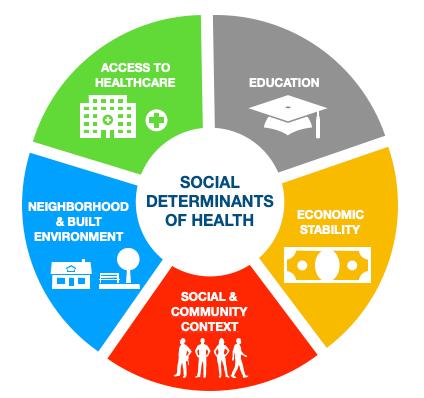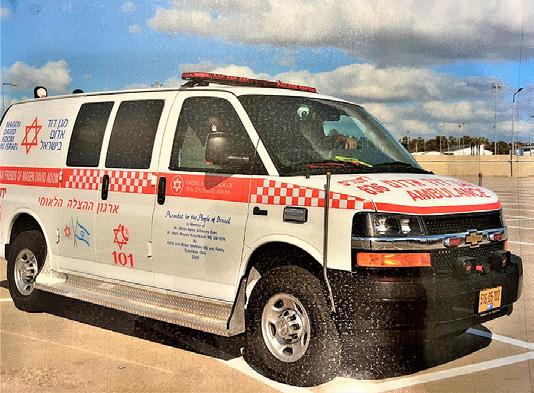
7 minute read
MSMS Update
By: Daniel M. Ryan, MD, MSMS Region 2 Director
FAQS: NEW IMPLICIT BIAS TRAINING REQUIREMENT – JUNE 1, 2022
Advertisement
The Michigan Department of Licensing and Regulatory Affairs (LARA) now requires implicit bias training for physicians and other health care professionals. The requirements apply to both new applicants as well as those renewing their existing licenses or registrations starting on June 1, 2022. To view frequently asked questions and answers regarding the new training requirements go to MSMS
website
MICHIGAN’S FISCAL YEAR 2023 BUDGET PASSES WITH MSMS-INITIATED PROPOSAL
The Michigan House, Senate, and Governor came to a final agreement on a $76 billion budget for Fiscal Year 2023 (FY 2023) on July 1st. An MSMS-initiated proposal was included in the final version of the budget, which will provide an estimated $60 million to support a Medicaid reimbursement uplift for adult and pediatric primary care providers. Under the initiative, the Department of Health and Human Services (DHHS) will allocate $15 million of general fund/general purpose revenue and any associated federal matching dollars to provide Medicaid reimbursement rates for primary care services at the greater of either the actual rates paid during the previous fiscal year, or at least 95% of the Medicare rate received for those services on the date the service was provided. “It’s wonderful when our lawmakers recognize problems and then work together to implement solutions, and that’s exactly what happened today with the announcement that a Medicaid uplift would be funded in this year’s general fund budget,” said Thomas Veverka, MD, FACS, MSMS President.
“On behalf of our member physicians across the state, I’d like to praise Governor Whitmer, Senate Leadership, and our state’s lawmakers for not only recognizing the problems Medicaid’s low reimbursement presents to Michigan’s patients and providers, but then working together to find and fund a solution. This now approved Medicaid uplift will expand access to care, supports primary care and physician practice sustainability, and most importantly, improve patient health, and all of that is worth celebrating,” Doctor Veverka said. “Now more than ever, patients need timely access to primary care, and the announcement that Medicaid reimbursement rates will be receiving a much-needed increase will go a long way towards ensuring that Michigan’s patients can access the care they need when they need it from the physicians they trust.” Lastly, MSMS is also pleased to see that current funding levels for Graduate Medical Education (GME) residency positions and MiDocs, which is a state-funded program set up to expand GME residency positions in select specialties to recruit and retain physicians in underserved areas in Michigan, were maintained in the FY 2023 budget.
MEMBER EXCLUSIVE: POPULAR MEDICAL RECORDS GUIDE UPDATED
Do you and or your practice administrators have questions regarding the ins and outs of medical records? For example, who owns the medical records? How long must we retain medical records in our practice? What is the appropriate process for charging fees for copying and preparing medical records for a patient? As part of the MSMS member exclusive Health Law Library you have access to the Medical Records Guide and so much more. This is a useful tool for all Michigan physicians. Bringing this piece to life digitally allows for MSMS member physicians to access this information 24/7.
Materials such as the Medical Records Guide are available to MSMS members to download free of charge. MSMS non-members and others will be required to pay an applicable fee. To join MSMS, please visit MSMS.org/JOIN. Please visit MSMS.org/Resources to find a variety of valuable resources available to physicians and their practice. Should you have any questions about the materials provided, please contact Stacey Hettiger or 517-336-5766.
157TH MSMS 2022 HOUSE OF DELEGATES MEETING WRAP-UP
Over the weekend of April 30-May 1, the Michigan State Medical Society (MSMS) House of Delegates (HOD) gathered in Kalamazoo to address 60 resolutions and four Board Action Reports, elect new officers and representatives, and celebrate the installation of Thomas J. Veverka, MD, FACS, as MSMS President.
The HOD is MSMS’s policy making body and resolutions are one of the key avenues for setting policy. Approximately 200
continued on page 16
M S M S U P D A T E
Delegates, Alternate Delegates, MSMS Board Members, and staff were in attendance to ensure the successful discussion of timely issues of concern to MSMS members and their patients. Resolutions were considered by five Reference Committees – Medical Care Delivery; Legislation; Internal Affairs and Bylaws; Public Health; and, Scientific and Educational Affairs. Testimony was received on a variety of issues including protecting the physician-patient relationship, social determinants of health, mental health needs, health care professional shortages, safety and accident prevention, membership data and recruitment, and many others. Below are some key policies and directives adopted during the meeting.
HOD Resolution Highlights
• MSMS will work with appropriate stakeholders to expand pediatric mental health capacity in Michigan, along with raising awareness of the Michigan Child Care Collaborative and available services. (01-22) • Clinically accurate, non-stigmatizing, person-first terminol ogy when referring to the disease of addiction will be encouraged and MSMS will incorporate such terminology in future communications and publications, as well as update existing policies in the MSMS Policy Manual. (04-22) • Identifying remedies to rebalance the supply and demand equation for primary care physicians by 2030 will be included in MSMS’s practice sustainability work. (06-22) • MSMS will support a permanent, expanded, and refund able child tax credit.(07-22) • MSMS is directed to engage in collaborative efforts with other stakeholders to identify common goals and objectives for improved synergy and advancement of physician leadership roles in local and state health depart ments. (27-22) • MSMS will work to achieve easily accessible, public transparency of practice agreements between physicians and non-physician providers, in the form of website and/ or marketing material disclosures, so that patients may be informed of the credentials of their entire care team. (29-22) • Reestablishing the MSMS Membership Committee. (45-22) • Advocating for the inclusion of annual, voluntary K-12 mental health screening that is evidence-based and age appropriate within all Michigan Public Schools. (56-22) The HOD action on all resolutions and Board Action Reports can be found in the 2022 House of Delegates FINAL Report. Questions regarding the 2022 MSMS HOD should be directed to Rebecca Blake. F
COVID-19 Vaccination Schedule
Vaccine 0 month 1 month 2 month 3 month 4 month 5 month 6 month 7 month 8 month 9 month
Pfizer-BioNTech (ages 6 months – 4 years) 1st Dose 2nd Dose (3 weeks after 1st dose) 3rd Dose (At least 8 weeks after 2nd dose)
Moderna (ages 6 months – 17 years)
Pfizer-BioNTech (ages 5-11 years) 1st Dose
1st Dose
2nd Dose (4 weeks after 1st dose) 2nd Dose (3 weeks after 1st dose) 3rd Dose (At least 4 weeks after 2nd dose)
3rd Dose (At least 4 weeks after 2nd dose) Booster Dose1
(at least 3 months after 3rd dose)
Pfizer-BioNTech (ages 12 years and older) Moderna (ages 18 years and older) 1st Dose
1st Dose 2nd Dose (3 weeks after 1st dose)
2nd Dose (4 weeks after 1st dose) 3rd Dose (At least 4 weeks after 2nd dose)
3rd Dose (At least 4 weeks after 2nd dose) Booster Dose1
(at least 3 months after 3rd dose)
Booster Dose1
(at least 3 months after 3rd dose) 2nd Booster Dose3
(at least 4 months after 4th dose)
2nd Booster Dose3
(at least 4 months after 4th dose)
Janssen (ages 18 years and older) 1st Dose 2nd (Additional) Dose2 using an mRNA COVID-19 Vaccine (At least 4 weeks after 1st dose) Booster Dose1 (at least 2 months after additional dose) 2nd Booster Dose3
(at least 4 months after 4th dose)
Note: Timeline is approximate. Intervals of 3 months or fewer are converted into weeks per the formula “1 month = 4 weeks.” Intervals of 4 months or more are converted into calendar months.
1 If eligible, people 5 years and older should receive an age appropriate COVID-19 vaccine booster dose, an mRNA (Pfizer or Moderna) COVID-19 vaccine is preferred. For people ages 5-17 years who received Pfizer COVID-19 vaccine as their primary series should receive an age-appropriate COVID-19 vaccine booster dose. Those 6 months through 17 years who received Moderna COVID-19 vaccine as their primary series are not recommended to receive a COVID-19 booster dose as a booster dose is not authorized for use in this age group. For people ages 18 years and older, either Pfizer-BioNTech or Moderna may be used as a booster dose.
Only Pfizer-BioNTech or Moderna COVID-19 vaccine should be used. Visit appendix D in the CDC's Interim Clinical Considerations for more information on vaccinating people who are moderately or severely immunocompromised and who received Janssen COVID-19 vaccine for the primary series.
People ages 18–49 years who received Janssen COVID-19 vaccine as both their primary dose and first booster dose may receive a second booster dose using an mRNA (Pfizer or Moderna) COVID-19 vaccine at least 4 months after the first booster dose. People ages 12 and older who are moderately or severely immunocompromised should receive an age appropriate second booster dose at least 4 months after the first booster. An mRNA (Pfizer or Moderna) COVID-19 vaccine must be used for the second booster.








